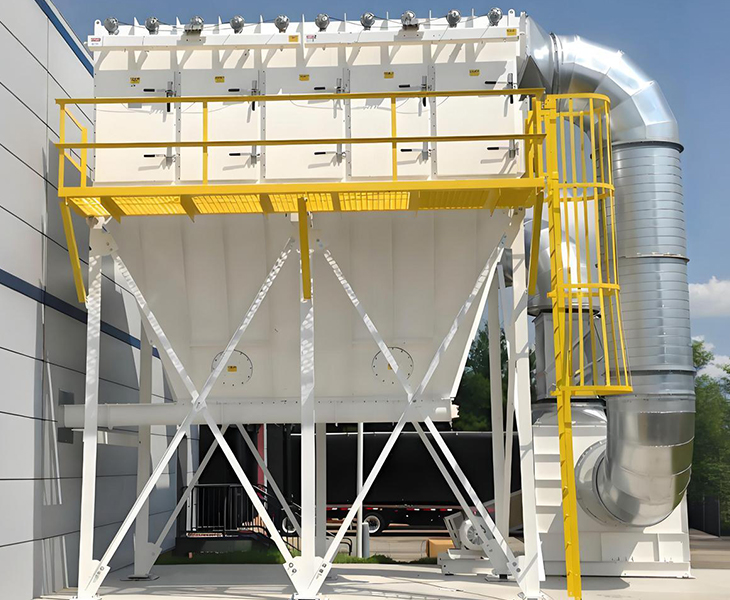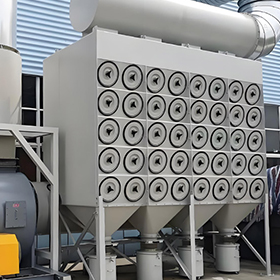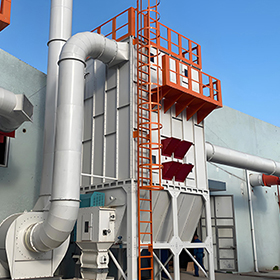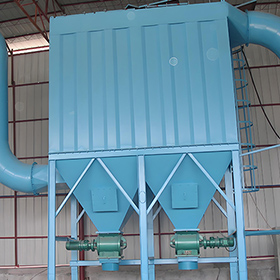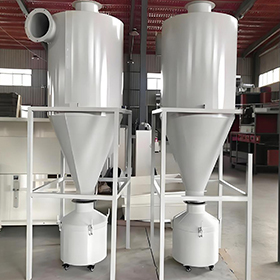Bag filter
-
High Efficiency – 99%+ dust removal rate
- Wide Flow Range – Handles 1 to 10,000+ m³/min for diverse applications
-
Simple & Easy Maintenance – Robust design with minimal downtime
-
Cost-Effective – Lower initial cost than electrostatic precipitators at equal efficiency
-
High-Temperature Resistance – Handles 200°C+ with fiberglass, PTFE, or P84 filter media
-
Material Versatility – Unaffected by dust composition or resistivity
Industry-Leading Bag Filter Manufacturer
As a premier bag filter manufacturer, DARKO combines 10+ years of specialized dust collection expertise with ISO-certified engineering excellence. Our high-performance baghouse systems serve global clients across cement, metallurgy, chemical, and lithium battery industries, with installations in 30+ countries. Engineered for energy-efficient operation with intelligent controls, DARKO bag filters deliver reliable particulate capture and extended filter life for demanding industrial applications.
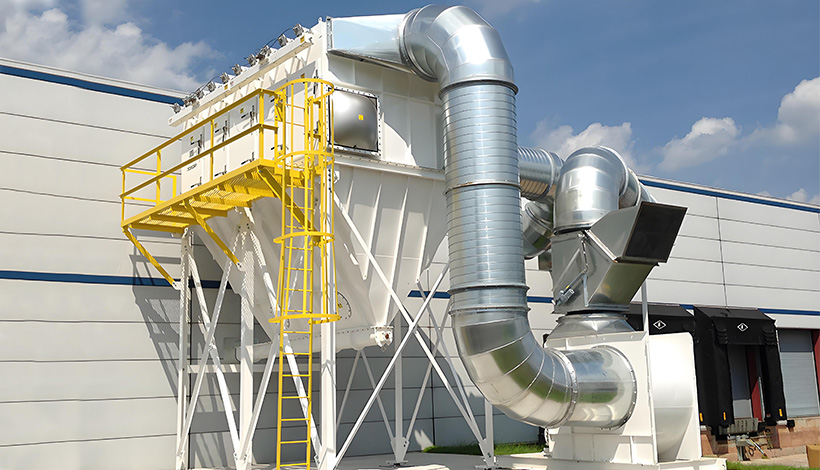
Bag Filter Working Principle
The high efficiency of baghouse dust collectors stems from their unique filtration mechanism. Dust-laden air enters through the lower inlet duct, where deflector plates redirect the flow into the hopper, causing larger particles to settle by gravity. Finer particles travel upward into the filter chamber, where they’re captured on the fabric filter bags through a combination of inertial impact, diffusion, interception, and electrostatic attraction. Clean air passes through the fabric and exits via the exhaust pipe, while trapped dust accumulates on the bag surface.
Periodic cleaning is achieved either by reverse-air flow or pulse-jet systems. In pulse-jet cleaning, compressed air bursts create shock waves that dislodge dust into the hopper, maintaining optimal airflow. The collected dust is then removed through a discharge system. The system’s performance heavily depends on filter media selection, with materials like PTFE or fiberglass offering temperature resistance and long service life. This combination of mechanical separation and fabric filtration ensures consistent >99% efficiency across industrial applications.
Bag Filter For Sale | Total Dust Control Solutions for All Industries
As a professional bag filter manufacturer, we provide customized high-efficiency dust removal equipment for a wide range of industries, including cement, metallurgy, chemical, power generation, food, papermaking, agriculture, and petroleum. From high-temperature flue gas treatment and explosion-proof systems to food-grade purification requirements, we leverage advanced bag filtration technology to deliver energy-saving, stable, and fully integrated industrial dust control solutions for our clients.
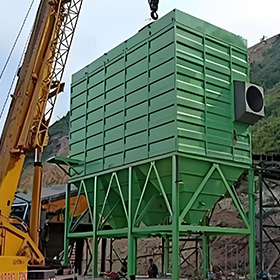
With sensors, It can monitor the gas flow and filtration status in real time, thereby enhancing operational efficiency.
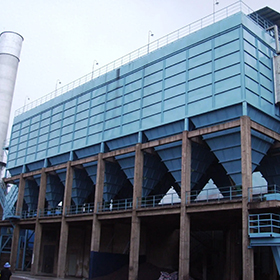
Using high-temp materials, it can withstand the high-temp gases during the metallurgical process, preventing the filter bags from melting or getting damaged.
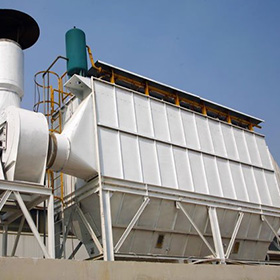
The multi-layer filter screen design enhances the efficiency. It is used in processes such as chemical reactions, powder transportation, and particle matter treatment.
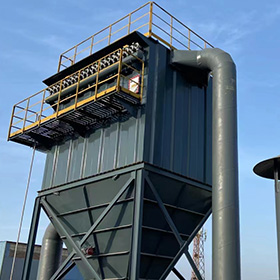
Using materials that comply with food safety standards, ensuring no contamination occurs when in contact with food.
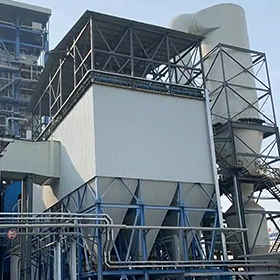
It is widely used in coal-fired, gas-fired and biomass-fired power plants. During operation, it maintains low noise levels and improves the plant environment.
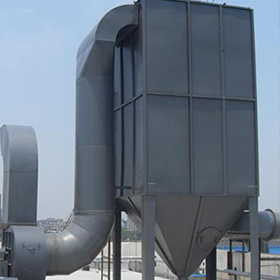
Chemical corrosion-resistant filter bags, such as polyester and polypropylene, reduce the impact of pulp and chemical substances on the equipment.
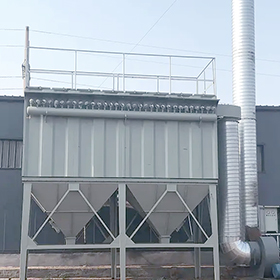
It is widely applied in various processes such as grain processing, feed production, seed treatment and fertilizer manufacturing.
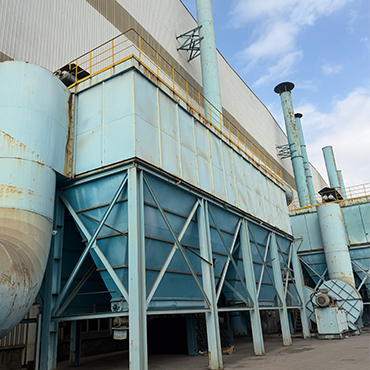
Handles high-temperature abrasive dust from sintering, furnaces, and converters. Uses heat-resistant filter bags to ensure stable ultra-low emissions.
Advantages of Bag filter
Engineered for maximum dust capture, operational flexibility, and cost-efficient performance across industries.

Achieves >99% dust removal efficiency, with outlet concentrations as low as 10mg/m³ – even for sub-micron particles.

Handles from 1m³/min to 100,000+ m³/min, suitable for industrial kilns and workshop ventilation alike.

Modular design allows quick bag replacement, minimizing downtime and operational costs.

50-70% lower capital cost than electrostatic precipitators at comparable efficiency levels.

Operates continuously at 200°C+ with fiberglass, PTFE, or P84 filter media.

Unaffected by dust composition or resistivity fluctuations, outperforming ESPs in variability.

Pulse-jet/reverse-air automation maintains stable pressure drop and efficiency.

Meets global standards (e.g., <10mg/Nm³), ideal for ESG-driven industries.
Our Service Process
Our end-to-end service ensures high-efficiency dust collection systems with reliable performance and fast technical support.
We analyze your production requirements to provide customized equipment selection ensuring perfect system compatibility.
Our senior engineers create personalized solutions with optimized system configuration based on your specifications.
Detailed pricing covering equipment, installation, shipping and after-sales service with no hidden costs.
Strict quality control at our ISO-certified factory guarantees reliable equipment performance.
Dedicated logistics team ensures on-time delivery with complete installation guidance and training.
24/7 technical support with scheduled maintenance alerts and fast spare parts delivery.
What is a Bag Filter?
Bag Filters are essential industrial filtration components designed to capture dust, particulate matter, and airborne contaminants in various applications. These high-performance filters are widely used in dust collection systems, HVAC systems, cement plants, power plants, woodworking, pharmaceuticals, and food processing industries.
Our industrial bag filters are engineered for superior air filtration, ensuring high dust-holding capacity, low pressure drop, and extended filter life. Made from premium materials such as polyester, PTFE, Nomex, and fiberglass, they provide excellent resistance to heat, moisture, and chemical exposure.
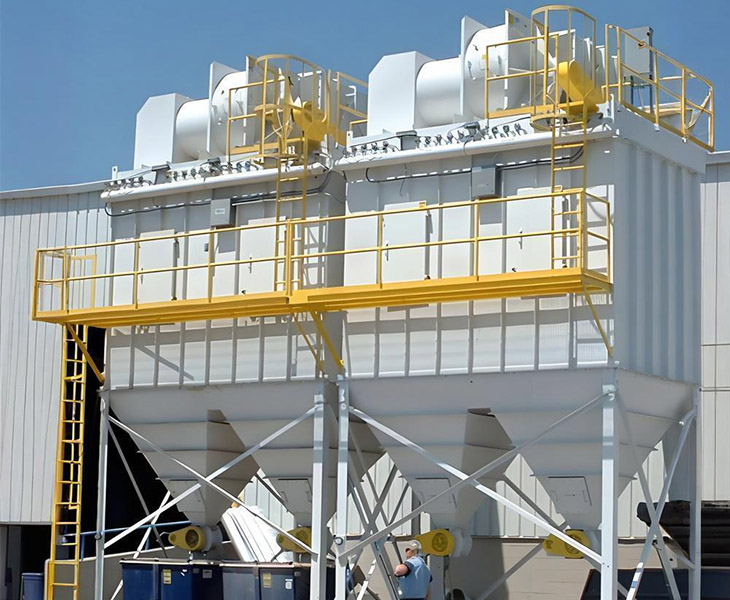
Why Choose Bag Filters?
Baghouse dust collectors are the premier choice for industrial dust control, delivering ultra-high filtration efficiency of 99.9%+ to capture particles as fine as 0.5 microns—ensuring compliance with strict environmental regulations. Featuring pulse-jet cleaning technology and long-lasting PTFE-coated filter bags, they reduce operational costs by over 40% compared to traditional dust collection systems. Their modular design serves diverse industries, including metalworking, pharmaceuticals, and power generation, with specialized configurations like explosion-proof and high-temperature-resistant models for enhanced safety. Integrated smart monitoring enables predictive maintenance, while valuable dust recovery (e.g., precious metal powders) adds economic value. Combining environmental sustainability with cost efficiency, bag filters represent the ultimate dust management solution for modern factories.
Own Factory, High Quality Manufacturing Power

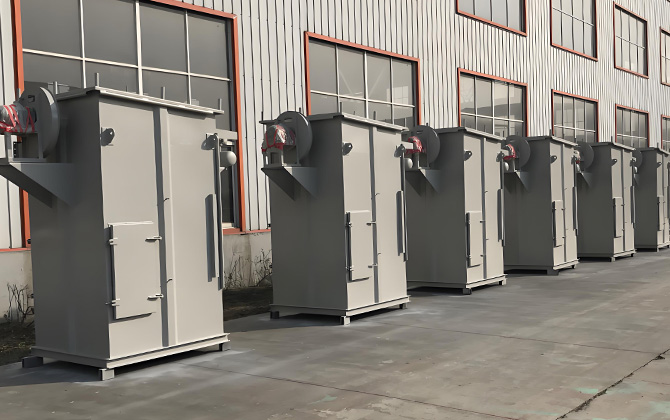
As a professional cement equipment manufacturer with 10 years of industry experience, Darko combines innovative engineering with reliable production capabilities. Our ISO-certified facility produces 400+ bag filter dust collection systems and 450+ conveying systems annually, serving 500+ global clients with complete solutions from cement silos to bag filter dust control systems.
Backed by patented technologies and an experienced R&D team, we specialize in customized, non-standard designs to meet diverse project requirements, including high-efficiency bag filter solutions for cement kiln and material handling. Equipped with advanced manufacturing facilities and strict quality control, we ensure every product, especially our core bag filter series, meets the highest international standards while delivering cost-effective, environmentally friendly solutions for cement plants and industrial applications worldwide.
Professional Bag Filtration System Custom Solutions
As a professional dust collector manufacturer, we provide customized bag filtration system solutions for various industries including cement, metallurgy, and food & beverage. Whether for new projects or technical upgrades, our high-efficiency and reliable dust collector manufacturing technology and system design help customers achieve emission compliance, energy optimization, and long-term stable operation. Every successful case is a testament to our expertise and continuous innovation in the field of industrial dust control.
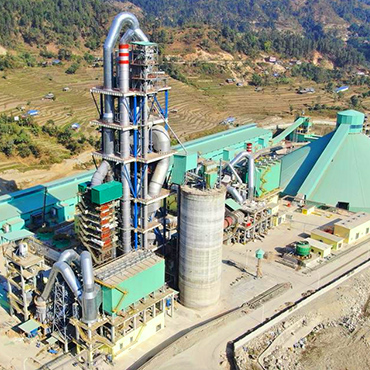
Addressing high-dust conditions in the cement industry, we customized the PPCS64-5 bag filtration solution for Huaxin Cement’s clinker bulk loading system, stabilizing emission concentrations below 30mg/Nm³ and supporting the plant’s transition to greener production.
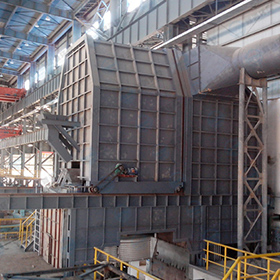
Facing high-temperature, high-dust challenges in the forging industry, we designed a high-negative-pressure dust removal system with an air volume of 350,000 m³/h. Operating under 4,500 Pa working conditions, it maintains over 98% collection efficiency, with emissions below 10mg/m³, meeting stringent environmental standards.
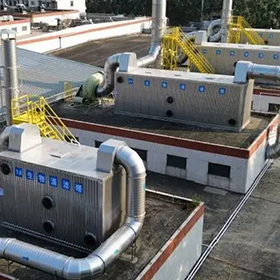
To address complex waste gas components in the food and beverage industry, we adopted a combined process of “mechanical dust removal + chemical neutralization + adsorption purification.” This approach enables synergistic treatment of acidic gases and organic emissions, achieving compliant high-altitude discharge and comprehensively improving factory environmental quality.
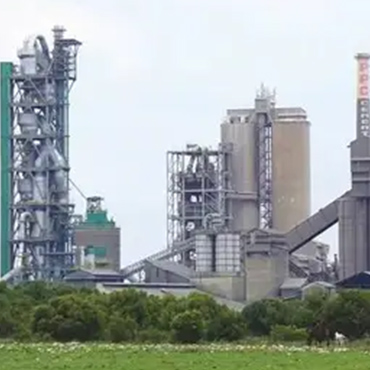
By optimizing filtration velocity (reduced from 1.06 to 0.67 m/min) and expanding filtration area to 23,352 m², we successfully lowered emission concentrations from 25mg/Nm³ to 5mg/Nm³ without increasing energy consumption. System resistance was significantly reduced, and operational stability greatly enhanced.
Custom-Built & Reliably Supported
We provide a complete range of standard and customized dust collection systems, supported by our global service network to deliver end-to-end solutions – from equipment selection to long-term maintenance – for industrial clients worldwide.
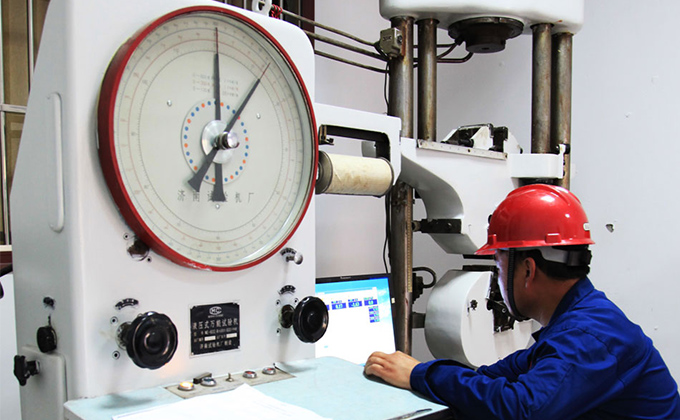
We provide both standard and custom-designed systems. Our engineering team creates tailored solutions for any application, backed by 10 years of industry experience. Choose from our complete range – compact cartridge collectors, industrial bag filters, and specialized flue gas filters – all optimized for your specific needs and space requirements.All filters are manufactured in our own factories, streamlining the process for optimal efficiency and strict quality control.
To ensure long-term stable operation, Darko prioritizes maintenance-friendly designs and provides complete after-sales service. Our cartridge dust collectors come standard with industry-leading nano-fiber filters that efficiently capture dust emissions and sub-micron airborne particles. Globally, we offer remote technical support, video guidance, and genuine spare parts to guarantee worry-free operation throughout your equipment’s lifecycle. Through preventive maintenance and continuous service support, Darko helps maximize equipment longevity while reducing operating costs and improving production efficiency.
More about Bag Filters
By fully understanding the relevant technical parameters and structural technology of the bag filters, you will have a clearer understanding of the performance advantages and application value of the equipment.
- Specification
- Applications of Bag Filters
- Types of Bag Filters
- Material Options
| Processing air volume(m3/h) | 800-550000 |
| Number of filter bags (bars) | 24-4000 |
| Inlet gas temperature (℃) | <220℃ |
| Air pressure for ash removal(Pa) | 4000-50k |
| Withstand negative pressure (Pa) | 2000-7000 |
| Inlet dust concentration(g/m3) | <1300 |
| outlet dust concentration(g/m3) | 1-50 |
Our dust collector bag filters are ideal for:
-
Cement & Asphalt Plants – Capturing cement dust & particulate emissions.
-
Steel & Foundries – Filtering metal fumes & grinding dust.
-
Woodworking & Sawmills – Removing wood dust & shavings.
-
Pharmaceuticals & Chemicals – Ensuring clean air in production facilities.
-
Power Plants & Boilers – Controlling fly ash & combustion byproducts.
-
Food & Beverage Processing – Maintaining hygienic air quality.
1. Pulse-Jet Bag Filters
-
Ideal for high-efficiency dust collection systems.
-
Uses compressed air for cleaning.
-
Suitable for cement, mining, and metal processing industries.
2. Shaker Bag Filters
-
Mechanical shaking mechanism for dust dislodging.
-
Cost-effective for wood dust, grain, and light particulate.
3. Reverse Air Bag Filters
-
Gentle cleaning method for delicate filter media.
-
Used in power plants and large-scale industrial applications.
4. Cartridge-Style Bag Filters
-
Compact design for HVAC and commercial air filtration.
-
High dust-load capacity with pleated media.
| Material | Max Temperature | Key Properties | Best For |
|---|---|---|---|
| Polyester | 135°C (275°F) | Cost-effective, good abrasion resistance | Wood, food, general dust |
| PTFE (Teflon) | 260°C (500°F) | Chemical-resistant, non-stick surface | Chemical, high-temperature fumes |
| Nomex | 200°C (392°F) | Flame-resistant, durable | Foundries, welding fumes |
| Fiberglass | 260°C (500°F) | High-temperature stability | Boilers, kilns, power plants |
Key comparisons:
| Parameter | Baghouse | Cartridge Collector |
|---|---|---|
| Dust capacity | High (2-5kg/m²) | Low (0.5-1.5kg/m²) |
| Maintenance cost | 30-50% cheaper bags | Frequent replacements |
| Particle size | 0.5μm+ | 0.3μm+ |
| Moisture resistance | Requires treatment | Better performance |
Depends on filter media:
-
Standard polyester bags: ≤130°C (150°C short-term)
-
Nomex bags: Continuous 200°C/peak 240°C
-
PTFE-coated fiberglass bags: Continuous 260°C/peak 280°C
-
Metal fiber bags: Up to 500°C (for incineration, etc.)
⚠️ Note: Operating temperature should be ≥20°C below media limits to prevent thermal deformation.
Typical pressure ranges:
-
Low-pressure pulse: 0.2-0.35MPa (for easy-to-clean dust)
-
Medium-pressure: 0.35-0.5MPa (general purpose)
-
High-pressure: 0.5-0.7MPa (for sticky dust)
Another common name for a bag filter is a baghouse or baghouse dust collector.
In some industrial contexts, it may also be referred to more generally as a fabric filter, fabric dust collector, or simply a filter bag system. The term baghouse is especially common in heavy industries such as cement, mining, and metallurgy.
The lifespan of a bag filter (baghouse) varies significantly depending on several factors, but under proper conditions, filter bags typically last 1 to 4 years in continuous operation. However, some applications may see shorter or longer service lives.
Key factors influencing bag filter lifespan include:
| Factor | Impact on Lifespan |
|---|---|
| 1. Filter Media Material | Different materials (e.g., polyester, PTFE, fiberglass, P84) have varying resistance to temperature, chemicals, and abrasion. |
| 2. Operating Conditions | – Temperature: Excessive heat can degrade fibers. – Gas Chemistry: Acidic/alkaline gases, moisture, or corrosive components attack fabrics. – Dust Properties: Abrasive dust (e.g., silica, cement) wears bags faster than fine, non-abrasive dust. |
| 3. Design & Maintenance | – Air-to-Cloth Ratio: Higher ratios increase dust load per bag, accelerating wear. – Cleaning Mechanism (pulse-jet, reverse air, shaker): Overly aggressive cleaning can damage bags. – Proper Installation & Sealing: Poor fitting leads to bypass wear. – Regular Inspection: Timely replacement of damaged bags protects surrounding bags. |
| 4. Application Industry | – Cement/Kiln Bags: May last 1–3 years under high temperatures and abrasive dust. – Power Plant Bags: Typically 2–4 years with stable flue gas conditions. – Chemical/Industrial Bags: Could be less than 1 year if exposed to corrosive substances. |
Core Dust Collection Equipment
-
Designed with multi-layered pleated filter cartridges for 99.97% filtration efficiency, optimized for fine particulate control in industries like cement, metalworking, and pharmaceuticals. Compact structure with easy maintenance ensures long-term stable operation.
-
Specifically designed for combustible dust environments with integrated explosion-proof devices and pressure relief systems, compliant with ATEX standards. Perfect for chemical, pharmaceutical, and metalworking industries.
-
Incorporating advanced pulse-jet cleaning technology for automatic filter maintenance and continuous high-efficiency operation. Offers large air volume capacity with low energy consumption, making it ideal for woodworking and food processing applications.
-
Utilizing centrifugal separation principle to effectively remove large particulate matter. Can serve as pre-filters or standalone units with simple structure, no consumables, and low operating costs – excellent for primary dust collection needs.
How is a bag filter selected?
Processing air volume
The air volume determines the size of a fabric filter. The operating airflow rate is generally used for airflow calculations. During design, it must consider the application environment and flue gas temperature of a fabric filter. If the temperature is set and the gas is cooled by dilution, the airflow rate should also consider the addition of diluted air.
Inlet gas temperature
The operating temperature of the fabric filter is a crucial design parameter. A difference between the operating and design temperatures can have serious results. This is because the temperature is restricted by two factors:
- Different filter materials have strict limits on their maximum temperatures. This includes their instantaneous allowable and long-term operating temperatures.
- To prevent condensation, you must maintain the gas temperature above the dew point by at least 20 °C.
Gas composition
Except for special cases, fabric filters handle mostly ambient air or flue gas from furnaces. In general, we calculate based on handling air. The gas composition is only considered if it affects the calculations of fan power, pipe resistance, and cooling device design. These depend on density, viscosity, and heat capacity.
Inlet dust concentration
The inlet dust concentration is often the dust mass concentration in standard volume. For the inlet dust concentration, consider the followings when designing :
- Equipment Resistance and Dust Removal Cycle.
- Filter Material and Housing Wear.
- Pre-Dust Collector and Filtration Velocity.
- Discharge Device
Outlet dust concentration
The outlet dust concentration must be below the values set by environmental and health regulations. The outlet dust concentration depends on the fabric filter’s design, the filter material, and the dust’s properties. It typically ranges from 1 to 50 mg/m³. For cases with harmful substances like lead and cadmium, a very low outlet concentration is required.
Withstand negative pressure
A fabric filter’s pressure resistance depends on process needs and the fan’s static pressure. For general-purpose fabric filter, the equipment pressure resistance is 4000 to 5000 Pa. When the pressure reaches 6000 to 8000 Pa,it will use long-bag pulse fabric filter. For negative pressure air conveying systems using Roots blowers, the design pressure resistance is 15 to 50 kPa.
Ash remocal pressure
The cleaning pressure is a key factor in designing fabric filter. Depending on air pressures , there are high (0.5-0.7 MPa), medium (0.35-0.5 MPa), low (0.2-0.35 MPa), and ultra-low (below 0.2 MPa). They are high-pressure (right-angle) and low-pressure (submerged) valves.
Fabric filter dust removal method
Pulse bag filters can use either online or offline dust removal methods.
Online means that the filter is still filtering the gas during pulse jetting. Online dust removal has little effect on system fluctuations during cleaning and filtration. However, it doesn’t clean the filter bags well. It also doesn’t allow for online maintenance.
Offline dust removal involves dividing the filter into several filtration chambers. Each bag chamber has an independent offline valve, a cylinder, and an electromagnetic pulse valve. It also has a compressed air control system. Before pulse cleaning each filtration chamber, the offline valve is closed.
Choose based on dust characteristics:
| Dust Type | Weight (g/m²) | Thickness (mm) |
|---|---|---|
| Light dust | 350-450 | 0.8-1.2 |
| Abrasive dust | 500-600 | 1.5-2.0 |
| Sticky dust | 550+ (coated) | 1.2-1.8 |
Special requirements:
• Anti-static bags: Surface resistance ≤10⁹Ω
• Food-grade bags: FDA-certified
Diagnostic steps:
-
Visual inspection:
-
Continuous emissions → Bag rupture (emergency shutdown required)
-
Intermittent emissions → Cleaning system fault
-
-
Data analysis:
-
Gradual increase → Bag aging (life assessment needed)
-
Sudden spike → Leaking tube sheet/seal failure
-
▶️ Solution: Install real-time dust monitors (with alarms).








